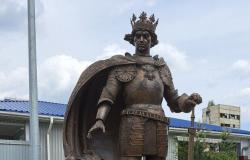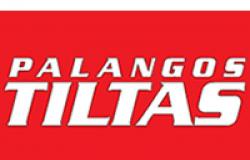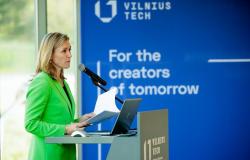“We live in an era of constant changes and transformations: technology is developing at an incredible speed, society is changing, and at the same time, the very idea of a university is changing. Although there is a prevailing belief in society that prosperity and economic security are ensured only by narrow studies of one subject, there will always be people who are not satisfied with narrow programs, people who search and create. Therefore, the system must give students the opportunity to construct their own learning programs, and not squeeze them into a narrow framework”, said the rector of Vytautas Didios University (VDU), prof. Juozas Augutis at the international forum “Transformation of the idea of the university: what is the role of liberal arts studies?” held on Friday.
Skills that transcend majors
The forum was held in commemoration of the 35th anniversary of the restoration of VMU: on April 26-28, 1989, the idea of restoring the university began to be implemented. The restored VDU became the first university in Lithuania to implement a study concept based on the model of Harvard University (USA) and the principles of Artes liberales (liberal arts): here the emphasis is on students’ freedom to choose, create their own schedule and acquire a broad education, not limited to the subjects of the chosen specialty.
At the international forum, academic experts, partners, decision-makers and other guests from the USA, Hong Kong, Taiwan and other countries discussed the change of the idea of the university in various aspects, including the confrontation of the liberal arts with bureaucratic obstacles and the significance of the development of artificial intelligence for the promotion of human creativity and entrepreneurship.
“A liberal arts education is fundamentally about embracing diverse perspectives, encouraging critical thinking, and fostering empathy and understanding. Here you don’t just study things, you get involved in the human experience. You study history, literature, science, philosophy and many other subjects, as well as how these disciplines relate to each other. Some may question the practicality of a liberal arts education, especially today, but I can assure you that nothing could be more practical than learning to adapt, think critically, and communicate effectively. These are skills that transcend any particular specialty. They prepare us not only for one career, but also for lifelong learning in a world that is constantly changing,” said Colleen Smith, a representative of the US Embassy, welcoming the participants of the forum.
According to the interviewee, her liberal arts education provided her with creativity and problem-solving skills that are invaluable in such a career. “Lithuania’s history was created by personalities who used literature, music, debates and philosophy while fighting against the occupation, thus preserving their identity and values. So the liberal arts are not just what we learn, but what we become. This is the education of citizens needed by our society”, said the representative of the embassy.
Aesthetic education for politicians
Internationally recognized artists, Massachusetts Institute of Technology (MIT) researchers, VDU visiting professors Nomeda and Gediminas Urbonai also presented their report at the forum. World-renowned artists discussed pragmatic fictions, the ever-changing infrastructures that support collaborative experiments in design, pedagogy, science, and artistic intelligence.
Multi-year projects of artists, in which various individuals, social groups and institutions participate, are interdisciplinary, combining art with science and other directions. Speaking about interdisciplinarity, Urbonai emphasized that in order to live sustainably in today’s world, we need to change our perspective and thinking habits.
“Try to see it from someone else’s perspective and the world will change. It’s common for us that a person is the center of everything, but maybe that’s where all the problems come from. After all, we are also part of the universe. Think about what would happen if you were, for example, in the place of a butterfly or a hedgehog. The perspective will change dramatically. This is just an exercise that we use in our projects, but it can be applied in other contexts as well: what will change if we look at the situation from the perspective of a foreigner, another culture, or a biologist, or maybe a politician,” said Nomeda Urbonienė.
Pushing the boundaries of art, science, and other fields, artists are interested in things that cannot be calculated. “We want to expand the boundaries of the artificial intelligence project by enabling other forms of intelligence. Without limiting ourselves to human intelligence, we want to explore the intelligences of other living creatures, as we did with swamps. As the British poet Alice Oswald said, artificial intelligence could never create good poetry because it does not know about its own death,” said Gediminas Urbonas.
When asked about the future of higher education, the artists emphasized that universities are a reflection of society: there is a lot of anxiety and division. However, the university is a good example of democracy, so its connection with state institutions should be stronger. “I believe that liberal arts can bring back the lost art of diplomacy,” said G. Urbonas.
Artists who work with people from various spheres assert that art can teach various forms of cooperation and changing perspectives, so aesthetic education is also necessary for politicians. “A great example is Antanas Mockus, who, as a university rector, mayor of Bogota, presidential candidate, combined aesthetic appreciation with public administration,” said G. Urbonas.
Five to seven careers in a lifetime
At the forum, representatives of VMU and partner universities also examined liberal arts and other models of higher education studies: how they are adjusted, modified according to societal changes caused by the progress of artificial intelligence or geopolitical and natural challenges.
Joddy Murray, dean of the College of Liberal Arts at Southern Illinois University Carbondale, USA, who began his speech with a Pablo Neruda poem, said that higher education in the United States is facing a cult of practicality. Both students and their parents hear that a broad education is a waste of time, and that the most important thing in education is the amount of salary.
“The liberal arts help us find our way. These are not answers, but questions about yourself and your life path. And if you can easily answer those questions, then they were wrong,” said Mr. Murray, who planned to become an Air Force pilot, but when he realized that it was not his career, he was very disappointed with his life decision. However, from that disappointment, he said he realized what he really wanted to study and achieve.
At the time, according to Shalendra Sharma, deputy vice president of Hong Kong’s Lingnan University, which has more than 20 years of liberal arts tradition, higher education institutions have a responsibility to students so that they can work in any country in the world after graduation. “The Industrial Revolution requires students to learn new skills of adaptability, resilience and perseverance. Imagine, you will have to change five or seven careers during your life, you will have to be mobile, go where there is work. The key will be human capital, which is a set of skills,” said the academic from Hong Kong.
Vilma Žydžiūnaitė, director of the Institute of Educational Research at VMU, noted that liberal arts education forms an intelligent, educated person who is able to create the art of learning in his own authentic way, and to be part not only of his place, but of the whole world: “The mission of liberal arts is to help students develop their personality and to become educated creative professionals who are open to the unknown.”
Getting out of your comfort zone and your bubble
In the second discussion, VMU graduates and other discussants examined how liberal arts education contributes to the development of expert knowledge and professionalism: how university studies reflect current social, business and cultural realities.
After graduating from the VMU International Relations and Diplomacy studies, but eventually turning to the path of a composer and now teaching at the VMU Faculty of Arts, prof. Titas Petrikis said that it was liberal arts education that gave him the courage to pursue his dream.
“The liberal arts give us the ability to make choices and decisions that are not very comfortable. It’s easier to stay where you are and not take on any challenges. Also, what happens when you study liberal arts is that you come across different social groups and you’re not locked in your own bubble. Here you meet people from different fields and make connections with them, which is very important in the future if you want to be successful in your profession. Thus, such open thinking is a natural feature of liberal arts education and a very important part of democracy,” said T. Petrikis.
Linas Vaitulevičius, one of the founders of “Rubedos”, a member of the board of the “MedIT” cluster, graduated from VMU with an IT major, but while studying he also attended anthropology lectures. According to him, it helped to get to know people better, their thinking and needs. “I did well at school and I didn’t know what I wanted to do in life. The extensive education offered by the university helped me realize my goals,” said the businessman.
Ambassador, EU Permanent Representative to OSCE Rasa Ostrauskaitė studied sociology at VMU, but turned to the path of diplomacy. “I understand the liberal arts as something broad, interdisciplinary, but most importantly, such studies promote culture, civic responsibility, and creative and critical thinking,” she said.
You can watch the recording of the conference on VDU’s YouTube channel.
…
Jonas Petroni’s photo.
Tags: university dilemma prepare young person constantly changing world
-






